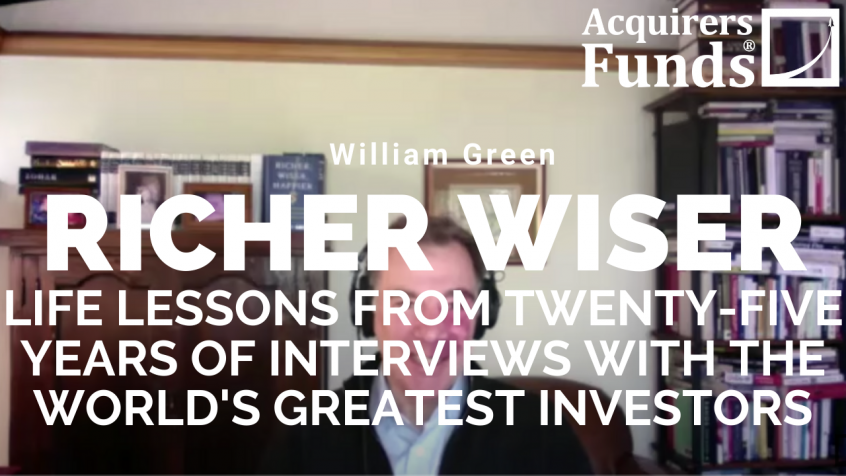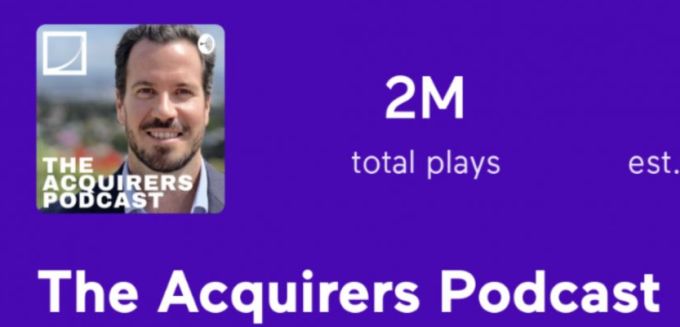During his recent interview on The Acquirers Podcast with Tobias, William Green, author of Richer, Wiser, Happier: How the World’s Greatest Investors Win in Markets and Life discussed Sir John Templeton: Mastering The Inner Game. Here’s an excerpt from the interview:
Tobias: You’ve been conducting these interviews– it says on the book you’ve been conducting the— in the overview that I got, you’ve been conducting these interviews with some of these folks for sort of 25 years, and I noticed one name in here that I thought was very interesting. You’ve had a discussion with Sir John Templeton, so how was the discussion with– What did Sir John have to offer?
William: Yeah, that was a fascinating experience. I feel like I’ve been wrestling with the memory of Sir John for 20 odd years, because I don’t feel like I got that right when I first wrote about him. I went to the Bahamas 20 or so years ago, when he was just about to turn 86, I think. For me, this was the consummate magazine journalism story. I’m going off to this beautiful place, it’s really sunny, the middle of a shitty New York winter/late fall. I got to stay in this beautiful hotel and go interview this iconic guy.
I think maybe I had slightly conned him into thinking that I really just wanted to write about the fact that he was at that point, obsessed with his whole spiritual research campaign. He was talking about how his goal really wish to increase spiritual information a hundredfold. I, in the way that cunning journalists would said, “Yeah, I really want to write about what you’re doing these days with all of this spiritual stuff, but really, I wanted to figure out, ‘oh, here’s this fascinating guy who was like one of the greatest investors of all time,’ and what can I learn from him about how to invest and how to get rich?”
We spent much of a day together. I was very struck by the difference between his image as this saintly figure, this grand old man who is super courtly, he had this wonderfully courtly charming manner, but then this reality that I saw this other side of his personality was very, very tough, and slightly sanctimonious, and pious and judgmental, and I was a bit of a mess, and in my mind was all over the place, and here’s this guy who won’t even allow himself a negative or unproductive thought, and he was so disciplined that he would say things.
One guy I interviewed about him said to me that when he first met Sir John, Sir John said to him, “Meet me at 4:02, I have another meeting at 4:13.” He was a billionaire who would take scraps of paper and staple them together to write on. While I was interviewing him, he didn’t want to waste any time. There was a point where I’m asking him questions, and he’s literally underlining a book for me at the same time.
There was something kind of intimidating about him, and slightly cold and slightly threatening to me, even though he was very quirky and charming. What I guess I realized many years later, when I was writing this book, is that he had mastered this inner game, he had mastered his own mind and his time and his energy to an extraordinary degree, and I had been too naive to see it and I think too much of a mess myself, too disorganized and scatterbrained and late for everything and chaotic, to appreciate just how profoundly powerful it was to have those characteristics.
He had been on a holiday very, very early in his life with his first wife, who had died on him on a motorcycle, leaving him with three young children to raise. One of the reasons he was able to survive and thrive was, because he had this extraordinary control of his own mind. You saw it also with investing. I write at great length about what I regard as the great bet of the 20th century where he made this astonishing contrarian bet, as the world is falling apart during World War II, and quintupled his money at a point where it just seemed insane for anybody to invest. It seemed like an inappropriate investment to insurance companies, for example, to buy stocks. Here you have this young guy buying 104 stocks all priced at less than $1, as Germany had just invaded France and Poland, and the world is falling apart.
I asked, “Has your faith really helped you as an investor?” He said, “Yeah, I never was depressed or despairing ever once.” As I say in that section about him, he never forgot that the sun also rises. It’s a really powerful lesson for a period like this, where people have been having a terrible time during COVID, obviously. What someone like Sir John just says, “Yeah, but the sun also rises, you survive these catastrophic periods, and then things improve.” I think in some ways, I was too naive and too judgmental to understand what made him extraordinary. There’s a thing in the notes on additional resources, which is a very quirky section that I’ve added to the book on things that people should read, where I talk about reading books of Sir John’s a couple of years ago, and literally groaning out loud and blushing, feeling myself blush, and just saying, “Oh,” and realizing that there were things he was trying to teach me 20 years ago that I was too stupid and too opinionated to listen to.
For me, one of the great lessons of writing about Sir John, has just been to try to keep an open mind. Here was a guy who was willing to fund research at places like Harvard into whether prayer worked. He would say, “Well, the sort of questions I’m exploring, does the person need to be putting their hands on the person they’re praying for? Do they need to be with them? Do they need to say, ‘Thy, will be done’? Or, do they need to do, is it better for the person who’s sick to do the praying?” I was a smart-alecky than probably agnostic or atheistic guy. Actually, the joke is now I’m much more spiritual, he would approve of the direction in which my life has gone. I just rolled my eyes at things like that. I thought, “He’s this kind of nutcase.”
William: At one point I said to him, “Do people ever say you’re a kook?” He’s like, “Yes, but I was always confident enough not to care what people thought.” I did understand that that was part of his extraordinary power as an investor, was the fact that he just didn’t give a damn what anybody thought of him. That has clearly turned out to be one of the key characteristics of all of the great investors that I’ve written about. This ability to go their own way, and not really care how other people judge them. I didn’t understand the second great lesson that, you need to master this inner game, this inner landscape of your thoughts and emotions, because for one thing, markets are so tumultuous that if you don’t gain control over that stuff, sooner or later, you’re going to come on undone.
You can find out more about Tobias’ podcast here – The Acquirers Podcast. You can also listen to the podcast on your favorite podcast platforms here:
For all the latest news and podcasts, join our free newsletter here.
Don’t forget to check out our FREE Large Cap 1000 – Stock Screener, here at The Acquirer’s Multiple:





